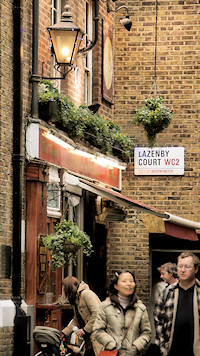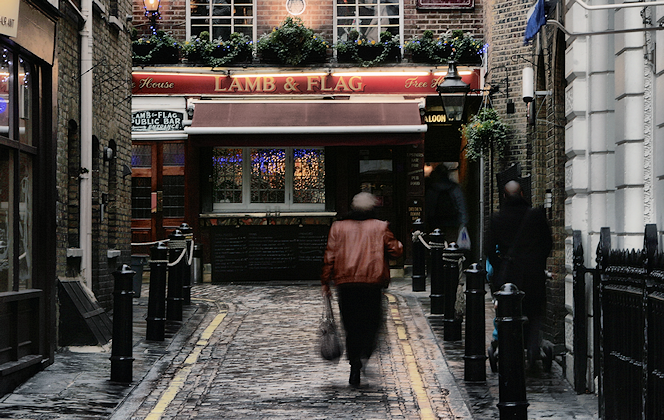Lamb and Flag
Ambuscades and buckets of blood
Lamb & Flag , Rose Street, Covent Garden

A dozen or more pubs claim to be the oldest in London and it’s impossible to deliver a decisive verdict on the winner of this accolade. How much can a place have been rebuilt and refitted and still be said to be the same premises? What if documentary confirmation of its age has been lost or if it hasn’t been a pub for the whole of the building’s existence?
One oft-cited contender for the title of London’s oldest pub is the Lamb and Flag in Covent Garden. At first glance this seems an implausible boast because its brick façade is little more than 50 years old. However, the building’s carcase appears to date from the early 18th century and it was first recorded as licensed premises in 1772, when it was the Cooper’s Arms. The building may have been a pub before then but this can’t be proved. There had previously been a Cooper’s Arms on the other side of the alley, and from 1751 to 1771 its licensee occupied both buildings but the use to which he put what is now the Lamb and Flag is unknown.
The poet and satirist Samuel Butler is supposed to have been one of the pub’s early customers but he died almost a century before it can even be confirmed that there was a tavern here. (Claims that the pub’s history can be traced back to 1623 are almost certainly erroneous.) Undoubtedly, though, Butler did live on Rose Street, which is a narrow, dog-legged thoroughfare, bisected by Floral Street, and with the exception of the Lamb and Flag it’s not much to look at nowadays.
The southern part of the street was originally called Red Rose Street and colloquially known as Rose Alley. It was here, on the night of 18–19 December 1679, that the notorious Rose Alley Ambuscade took place, when the poet John Dryden was attacked by masked ruffians as he made his way home from Will’s coffee house, which stood at the corner of Russell Street and Bow Street. The thugs were probably hired by the very naughty John Wilmot, 2nd Earl of Rochester, and the Duchess of Portsmouth, the mistress of Charles II, in revenge for an anonymous Essay on Satire, which vilified the king, the earl and the duchesses of Cleveland and Portsmouth. The essay was widely attributed to Dryden but actually written by John Sheffield, 3rd Earl of Mulgrave, and later 1st Duke of Buckingham and Normanby.
In the early 19th century the pub (or perhaps just its ground-floor back bar) was nicknamed the Bucket of Blood, probably because it hosted bare-knuckle fist fights. Formally, the Cooper’s Arms became the Lamb and Flag in 1833. This was a once-common London public house sign depicting the Holy Lamb bearing a cross surmounted by a golden streamer, which is the armorial device of the Middle Temple. It derives from ancient tiles in Temple church, said to have represented an emblem used by the Knights Templar. The Fleet Street gateway to the Middle Temple has a sculpture of the Lamb and Flag on its keystone, dated 1684.
As one might expect, the Lamb and Flag has a very traditional interior, with lots of brass and dark-varnished wood, antique fixtures and old photos, cuttings and caricatures on the walls. It’s well regarded for its selection of ales but reviews of the cuisine are mixed – as is often the case with pubs. The place can get very crowded at peak times, especially downstairs, and many customers choose to drink outside if the weather is clement.

Lamb & Flag, 33 Rose Street, London WC2E 9EB
Phone: 020 7497 9504
Open: Monday–Saturday 11.00am–11.00pm; Sunday noon–10.30pm
Website: Lamb and Flag
Nearest stations: Leicester Square (Northern and Piccadilly lines); Covent Garden (Piccadilly line)
“Whereas John Dreyden, Esq. was on Thursday the 18th instant, at night, barbarously assaulted and wounded in Rose-street, in Covent-Garden, by diverse men unknown: if any person shall make discovery of the said offenders to the said Mr. Dreyden, or to any Justice of the Peace, he shall not only receive fifty pounds, which is deposited in the hands of Mr. Blanchard, goldsmith, next door to Temple-Bar, for the said purpose, but if he be a principal or an accessory in the said fact, his Majesty is graciously pleased to promise him his pardon for the same.”
London Gazette, No. 1472, 29 December 1679

